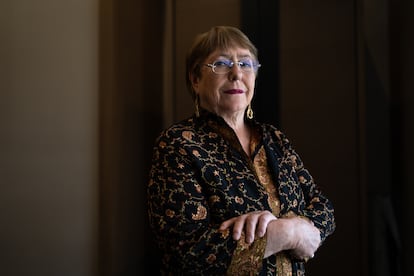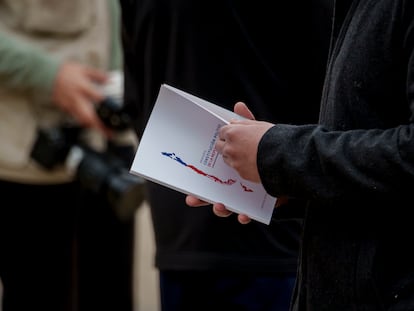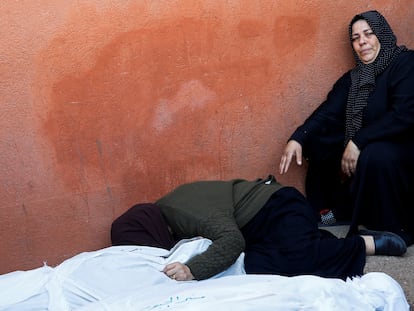Michelle Bachelet: ‘The rise of the extreme right with a certain disaffection with democracy is worrying’
On the occasion of her participation in the National Summit of Elected Women of Colombia, organized by U.N. Women, the former president of Chile talks about what it is like to be a woman in politics, the humanitarian tragedy in Gaza and the authoritarian drift in Latin America


Michelle Bachelet has been a woman of firsts in politics. She was the first woman president of Chile in 2006 and repeated her term in 2014. She was the first woman to be Minister of Health and Minister of Defense. She was the first executive director of U.N. Women, the first female High Commissioner for Human Rights of the United Nations. She is a qualified surgeon, pediatrician, and a mother of three. The daughter of an anthropologist and a general tortured by the dictatorship, she took her mother’s words seriously. “Your destiny in life is not necessarily to be someone’s wife and to have a child. You decide. But whatever you are going to do, do it well, and prepare for it,” she told her when Bachelet was a teenager and there were a few years left until both of them would suffer the Pinochet dictatorship firsthand: detained in the regime’s worst detention center, tortured, and exiled.
Bachelet remembers it now. She is about to meet with Colombian women politicians at the National Summit of Elected Women, led by U.N. Women. She spoke with EL PAÍS about topics ranging from the obstacles she has faced for being a woman in politics, to the most immediate present of the plebiscite in Chile that she has taken a position against and the humanitarian tragedy in Gaza.
Question. What is the greatest lesson you have learned from being a woman in politics?
Answer. Any woman in any field in which she was a pioneer faces many obstacles, like the discrimination of thinking that there are not so many competent women and that there are many men who are. When I was elected there were people who told me ‘I will never vote for a woman,’ they rated me by my physical appearance, by the clothes I wore. Women tend to be questioned about things that are not substantive and are often dismissed. Any mistake that is considered good in a man — because to err is human — is considered a tragedy in a woman. They measure us with a different yardstick.
Q. During your governments, did you feel that you were treated differently because you were a woman?
A. If my predecessor showed any emotion about something in his first term, he was a sensitive man. If I showed emotion, I was hysterical or neurotic. If there was a complex issue and I considered that I should take time to make a decision, I was indecisive. But if I made a quick decision on an issue that I thought was clear, I was improvising or had not thought about it enough. In the end it didn’t matter, they were going to try to show that I was wrong. That’s the brutal thing of the patriarchy where women are treated as second class.
Q. Do you remember anything in particular that illustrates the double standard?
A. I remember an article they published in which they might as well have said that the president of my party had given birth to me; they said that he had made me, that I had no merits of my own. Another time, during the campaign, I was separated and so I didn’t have a partner, and a journalist asked me: ‘And how are you going to [be president] if you don’t have a partner to support you and, furthermore, how will you deal with your children?’ Would they ask the same thing to a man? No one will ever tell them that they are abandoning their children, but they’ll say it to a woman, naturally. Of course, women can also make mistakes. We change our minds about things, because we are human, but women are not allowed to do so.
Q. U.N. Women reports that in Latin America there was a slight increase in women in elected positions (although Colombia is below the regional averages). Why do you think it is so difficult to achieve parity?
A. In many cases, financial institutions do not give women the same credit as men. In others, women do not have enough resources to run a campaign, nor do they get enough support from a party, or they include them because women must be included, but they are not pushed to be elected. The same women also see the politicians fighting over things that are not the problems that afflict them. They feel that there is a distance between political parties and the voters. Therefore, they say, why are they discussing this so much when what matters to me is being able to make ends meet? Many times the world of politics is guilty of navel-gazing. With all this going on, it is essential that women participate, because our societies are at least equal. 50% of the world is female, and we must secure electoral laws.
Q. Women’s rights seem to be under constant threat...
A. There is the tremendous risk that we are seeing in the region and in the world, and it is the growth of the extreme right with a lesser or with a certain disaffection with democracy, saying that, [given the choice] between an authoritarian government that gets results and a democracy that does not, they have no problem voting for an authoritarian government. This is a tremendous blow for democracy and, of course, it is not enough for it to be representative; it has to be more participatory, because the people also have ideas of how to solve problems. They want to be part of the solution as well.
Q. And how does this shift to the extreme right affect women in particular?
A. I see it in my own country, days before a constitutional proposal is voted on that has a number of things that are dangerous for women, and that are going to mean setbacks. In the experts’ plan [drawn up by the Constitutional Council] they talked about equal pay but that was erased, and they banned arbitrary discrimination. And what does that mean? Nothing. While claiming that they aren’t (but knowing that they are), they added some phrases in three clauses that are aimed at trying to repeal the Voluntary Interruption of Pregnancy law that I passed. The same goes for equality, for which they have left only two sentences. A Constitution must be a common basis that enables the laws that exist to be improved and not used as a floor and a ceiling.
Q. As former High Commissioner for Human Rights, how do you rate what is happening in Gaza right now and the debate about the ineffectiveness of the U.N. to stop the massacre?
A. First of all, it is good that there are debates about the effectiveness of the Security Council, because I have come to a country where all the presidents have been against the veto of the Big Five. We believe that that paralyzes and immobilizes [the U.N.] and we saw it in Gaza. What Hamas did was horrific, inexcusable, but also what has happened, especially to women and children who are dying in droves, is horrendous. Women and children should be evacuated from Gaza for humanitarian reasons. The secretary general has just invoked Article 99, and I hope that has some results. Gaza has undoubtedly been a conflict that has existed, but never with the force and the drama [that we see] now. I understand that Israel has to defend itself, but not at any cost. The rules of war, of international humanitarian law, must be respected.
Q. You, in particular, were a victim of the dictatorship. How do you feel about those images of naked detainees and dismembered and mutilated children that we have seen?
A. December 10 marked the 75th anniversary of the Universal Declaration of Human Rights, which was made necessary by the horrors of World War I and II. The commissioners said, we must have minimum standards of civilization. The truth is that 75 years later, not only is it still valid in terms of what we should guarantee, but it is still violated every time there are interests among countries that are attached to the Declaration and talk about human rights. But when certain interests are affected, they violate them without any problem. For me it is shocking, my heart and soul hurt when I see those images.
Q. You mention big interests and you also saw it with China. What were the pressures in that country like and how did you face them?
A. There were all kinds, and not only from the country in question. There was a G7 meeting that had a four-page declaration, two and a half pages said that I had to go to China, and when I reached the agreement to go, a new declaration was that I should not go because they were going to manipulate me. You realize that there are other people above you too. I finally went during the pandemic and spoke to many people. In the end, I also asked the Chinese government to give us their explanation of things and tried to make it so the report contained everything.
Q. Were you satisfied?
A. I think we did the best we could, as much as we could. Of course, governments are always angry with reports.
Q. And in the Latin American region? The handling of the Cuba and Venezuela issues was also controversial...
A. In the case of Venezuela, I sent an advance party first and a well-balanced agenda was prepared. I met with the victims of the FAES (Special Action Forces), the opposition, the government, everyone, and we put together a first report.
Q. And with Cuba?
A. What happens is that we make the reports requested by the Council. It’s not that you wake up tomorrow and say, I’m going to do it. And there was no request for a report from Cuba, at least at that time. A resolution was taken from Nicaragua and that is why it is done permanently; in Venezuela too, but they also created a special commission of three rapporteurs.
Q. And now, having retired from that position, what examples of authoritarian drift specifically worry you in Latin America?
A. I am worried about Guatemala. And what has happened in El Salvador. This Nayib Bukele model has apparently been effective, according to the data they provide, but at a very brutal cost, because many mothers say that their children were not in the gangs and are classified as such only because of the tattoos. I can’t say if they were or not. The only thing I would hope is that there was due process and that they are kept in decent conditions, and having them half naked on the ground is not. A person can do horrible things, but they have the right to prove their innocence. And the other thing that worries me in Latin America is the rise of the extreme right, which can imply that respect for human rights is not necessarily the same and that there are people who may have more rights than others. Or that the response to certain things like the security issue is more repression, and less prevention. The truth is that no one has the silver bullet or the magic formula for how to solve very complex problems that the region has.
Sign up for our weekly newsletter to get more English-language news coverage from EL PAÍS USA Edition









































